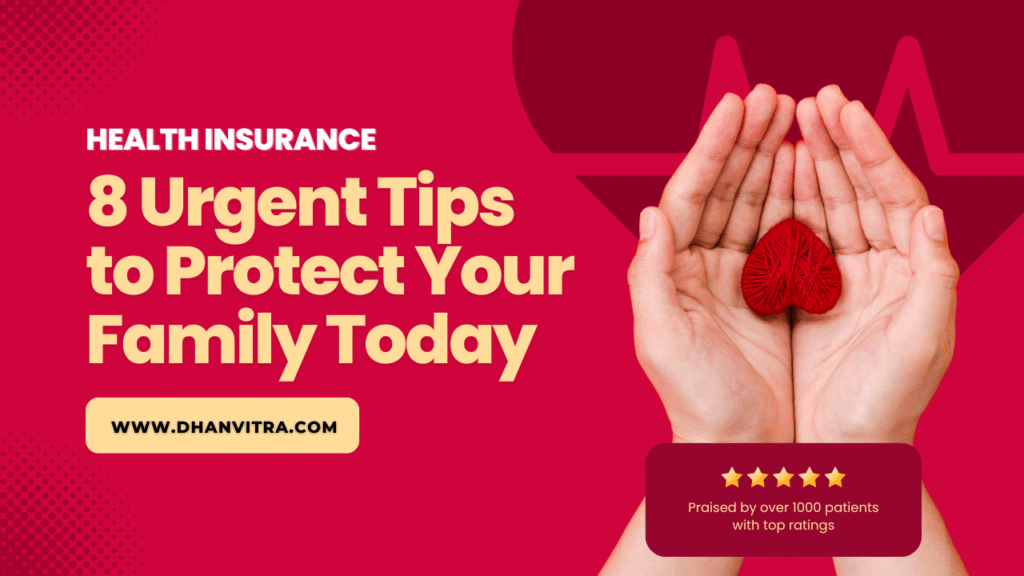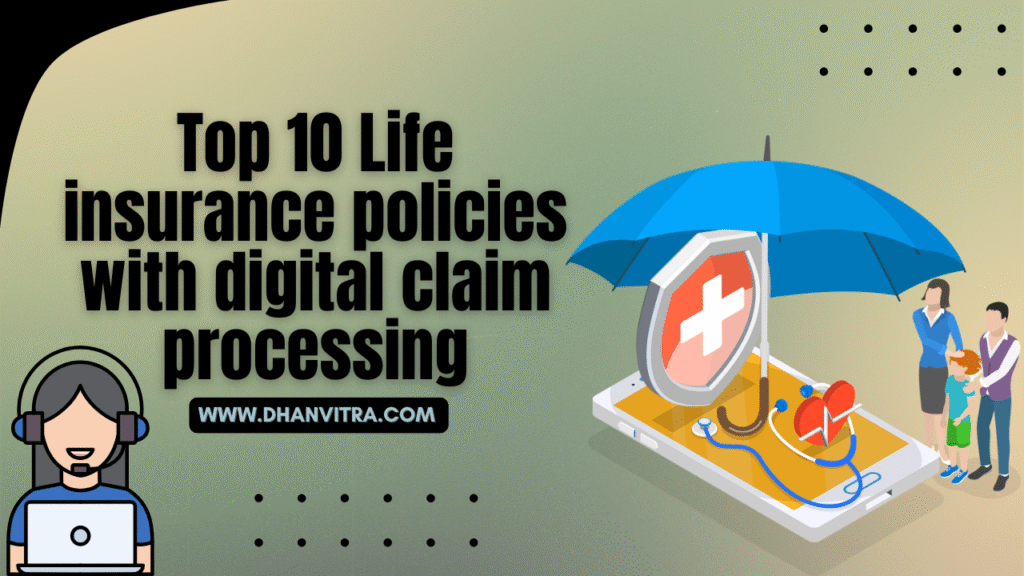
Hey there! If you’re reading this, you probably care about your family’s health and financial safety—and that’s exactly why you’re in the right place. Health emergencies can hit anytime. One unexpected hospital visit can turn your savings upside down. That’s where health insurance comes in.
At Dhanvitra, we believe in helping you make smart financial choices that protect what matters most—your loved ones. In this blog, we’ll walk you through 8 urgent tips to protect your family today with the right health insurance. From picking the right plan to avoiding common mistakes, we’ve got you covered.
We’ll break it down in simple terms, so you don’t get lost in confusing jargon. By the end, you’ll feel confident making decisions that keep your family safe and financially secure. Ready to take control? Let’s dive in!
Tip 1: Evaluate Your Family’s Health Needs
Before rushing into buying any health insurance plan, take a step back and really think about your family’s health needs. Every family is different. Some families have young kids, while others have teenagers or aging parents. Each age group comes with unique health risks and priorities. For instance, kids might need coverage for vaccinations, while older family members may require chronic disease management or hospitalization benefits.
Lifestyle is another big factor. Are you and your family active, healthy, and rarely fall sick? Or is there a history of health issues like diabetes, heart problems, or asthma? These details matter because they affect the type and size of coverage you need. Ignoring them can leave you underinsured when a serious medical event occurs.
It’s also crucial to think long-term. Health issues don’t always appear suddenly. They may develop gradually over the years. Planning for future health needs, like maternity care, cancer treatment, or lifestyle disease management, ensures that your family won’t face a financial shock down the line. Taking this step seriously saves both money and stress later.
Tip 2: Understand Different Types of Health Insurance
Health insurance isn’t one-size-fits-all. There are many types of policies, and picking the wrong one can leave you exposed.
Individual health insurance plans cover just one person. These are ideal if you have a single adult or an independent family member who needs customized coverage. Family floater plans, on the other hand, allow multiple members to share a single sum insured. This can be cost-effective, but you need to ensure the coverage limit is enough for everyone.
Then there are specialized plans like critical illness policies or hospitalization plans. Critical illness coverage focuses on specific diseases like cancer, heart attack, or stroke. Hospitalization plans cover the cost of inpatient treatment and can be lifesavers in emergencies. Understanding these differences helps you make informed choices and ensures your family gets the protection they truly need.
Tip 3: Compare Plans Before Buying
It’s tempting to pick the first policy that looks affordable, but don’t fall into that trap. Comparing plans is the key to smart decision-making. Look beyond premiums. Check the coverage limits, what is included, and what is excluded. Some plans may seem cheap, but hidden clauses can create problems when you need to make a claim.
Use online comparison tools or consult insurance advisors to see multiple options side by side. Pay attention to deductibles, co-payments, and claim settlement ratios. Think about scenarios where your family might need expensive treatments and check if the plan will actually cover those costs. Smart comparison saves you from unpleasant surprises and ensures the money you spend gives maximum value.
Tip 4: Opt for a Network of Hospitals
When buying health insurance, the network of hospitals included in your plan is crucial. Network hospitals are tied with your insurer to provide cashless treatment. This means that in emergencies, you won’t need to pay upfront and wait for reimbursement. You just present your insurance, and the hospital bills the insurer directly.
Having access to quality hospitals in your area or city is also important. If your insurer’s network is limited, you might have to travel far for care, which is stressful during emergencies. Ensure that the hospitals in your network have good doctors, proper facilities, and emergency services. This small step makes a big difference when your family needs fast, reliable care.
Tip 5: Check the Policy’s Waiting Periods
Many people overlook waiting periods, but they can make or break your experience with health insurance. A waiting period is the time you must wait before certain treatments or conditions are covered. For example, maternity benefits or pre-existing conditions often have waiting periods of 1–4 years.
Knowing this upfront helps you plan better. If a family member needs treatment for a pre-existing condition, you won’t be shocked to find out it isn’t covered immediately. Some policies allow you to reduce waiting periods by paying a slightly higher premium. Understanding these terms ensures that your coverage starts working when you need it most.
Tip 6: Keep an Eye on Renewal Terms
Renewing your health insurance might seem simple—just pay the premium and continue. Policies often come with fine print about renewal conditions. Some insurers impose age limits, while others may exclude coverage for certain illnesses if not renewed on time. Imagine you miss a renewal by a week, and suddenly your family is left unprotected. That can be a nightmare.
Always check if your plan has lifetime renewability. This feature ensures that even when you’re 70 or 80, you can keep your policy active. It’s crucial for families with older members or those with chronic health conditions. I suggest marking the renewal date on your calendar, setting reminders, or even automating payments. Staying vigilant about renewal terms keeps your coverage uninterrupted. Trust me, it’s a small effort for a huge peace of mind.
Tip 7: Add Riders for Extra Protection
Health insurance is great, but sometimes the base policy isn’t enough. That’s where riders come in. Think of riders as bonus shields. They enhance your coverage for specific situations.
For instance, an accidental death or disability rider provides extra cash if something unexpected happens. A critical illness rider steps in if you’re diagnosed with diseases like cancer, a heart attack, or kidney failure. These riders may cost a little more on top of your premium, but they are worth every penny.
Riders help you tailor your policy. You’re not just buying a standard plan—you’re building a safety net that suits your family’s exact needs. And here’s a tip: review rider options annually. New riders are introduced, and some cover emerging health risks like pandemics or lifestyle diseases. Adding the right rider today can save your family from a financial disaster tomorrow.
Tip 8: Review Your Policy Regularly
Your family’s needs change. Maybe your kids are growing, or you’ve developed a new health condition. Maybe inflation has made hospital costs skyrocket. Regular reviews help you adapt.
Check if your sum insured still covers potential medical expenses. Update the number of family members listed. Ensure any new illnesses or conditions are included. A yearly review is enough, but during life changes—like childbirth or surgeries—it’s wise to check immediately.
You can even compare your current plan with new market options. Sometimes switching or upgrading makes more sense than sticking with an old plan. Remember, the goal is continuous protection, not just ticking a box. A little attention now prevents a huge headache later.
Common Mistakes to Avoid
Even the smartest people make mistakes with health insurance. One big trap is ignoring the small print. Policies are full of exclusions, waiting periods, and co-payment clauses. Overlooking these can leave you unprepared when you need help the most.
Another mistake is chasing the cheapest policy. Low premiums are tempting, but they might come with limited coverage, narrow hospital networks, or high deductibles. You want value, not just a low price.
People also forget to update their policy after life changes. New family members, lifestyle changes, or evolving health conditions all need coverage adjustments. Skipping this step can nullify benefits when emergencies strike.
Lastly, many delay renewing policies until the last moment. Even a single missed day can trigger waiting periods or exclusions. Staying proactive and informed ensures you get the maximum protection without surprises.
Benefits of Having Adequate Health Insurance
Having adequate health insurance is more than just a financial safety net. It is a lifeline that can give you freedom, confidence, and peace of mind. Think of it this way: you can’t predict accidents or sudden illnesses, but you can control how they affect your family financially. With the right coverage, you don’t have to worry about hospital bills piling up. You can focus entirely on recovery instead of stressing over costs.
Adequate health insurance also allows you to access better healthcare. Many policies provide a network of hospitals where you can get treatment without worrying about upfront payments. This means you can get faster and better care without the added pressure of negotiating costs. For families, this is a huge relief. Children, elderly members, and anyone with chronic illnesses can receive the attention they need immediately.
Additionally, having strong health coverage helps you plan for the future. You can include provisions for critical illnesses, maternity, or regular check-ups. Over time, medical costs tend to rise, but a comprehensive insurance plan adjusts for inflation and ensures you are never caught off guard. In short, health insurance is not just about bills—it is about securing your family’s well-being, future stability, and mental peace.
How to Choose the Right Insurance Provider
You want a company that you can trust in times of crisis. Start by looking at their claim settlement ratio. This number shows how often the insurer pays claims without unnecessary delays. A high ratio is a strong indicator that the company is reliable and efficient.
Next, consider the customer service experience. You need an insurer that is easy to reach and responds quickly. In emergencies, you cannot afford long waits or confusing processes. Digital access matters too. Most leading insurers now offer apps and online portals that let you check policies, submit claims, and track approvals from your phone. This is especially important for a global audience where convenience and quick service are crucial.
Reputation matters a lot. Talk to friends or family, and read forums if needed. Avoid getting swayed by low premiums alone. Sometimes, a cheaper plan means more exclusions and less support when you actually need it. Pick a provider who aligns with your family’s health needs and promises peace of mind, not just low costs.
Conclusion
Health insurance is not just a piece of paper. It is a commitment to your family’s safety, health, and future. By evaluating needs carefully, comparing plans, choosing the right provider, and keeping coverage updated, you can protect your loved ones from financial stress and medical uncertainty.
Remember, life is unpredictable. Accidents happen, illnesses strike unexpectedly, and healthcare costs rise every year. A well-chosen health insurance plan shields you from these uncertainties. It allows you to focus on what really matters—spending time with your family, staying healthy, and living without constant financial worry. Don’t wait until a crisis hits. Take action today. Your family deserves nothing less.
FAQs
How much health insurance coverage does a family need?
The coverage depends on your family size, ages, and medical history. Globally, experts recommend a minimum of three to five times your annual medical expenses to be safe.
Can I switch health insurance providers anytime?
Yes, in most countries, you can switch providers during policy renewal or without waiting for the next cycle, but always check for continuity benefits and pre-existing conditions coverage.
Are pre-existing conditions covered immediately?
Usually, there is a waiting period for pre-existing conditions. This can range from a few months to a few years, depending on the policy. Always read the terms carefully.
What are the tax benefits of health insurance?
Many countries provide tax deductions on premiums paid for health insurance. This can significantly reduce your taxable income while ensuring protection for your family.
How do I make a claim hassle-free?
Keep all medical records and bills ready. Notify your insurer promptly and follow the claim process as outlined. Digital submission often speeds up approval and payment.










